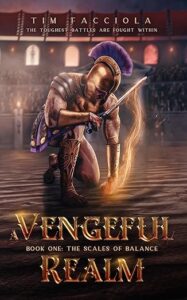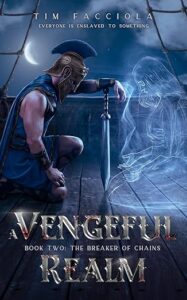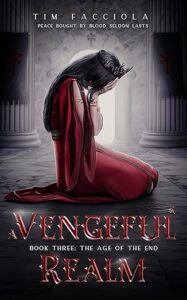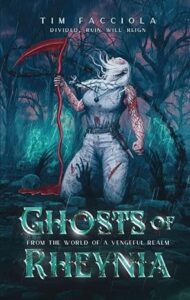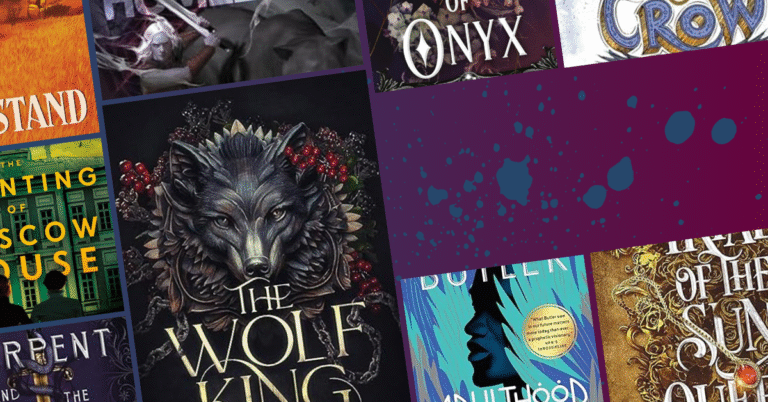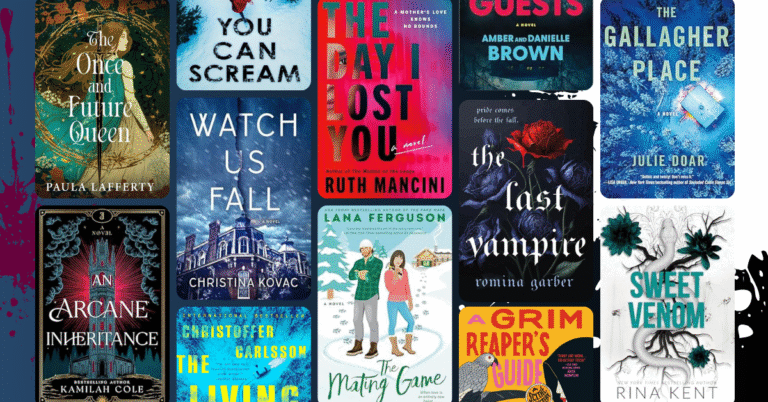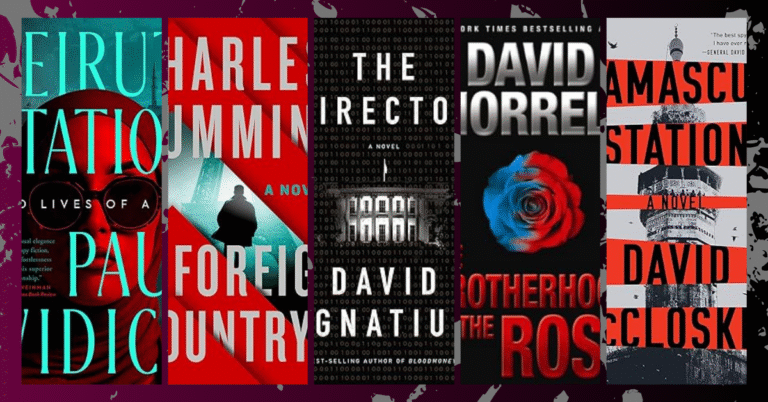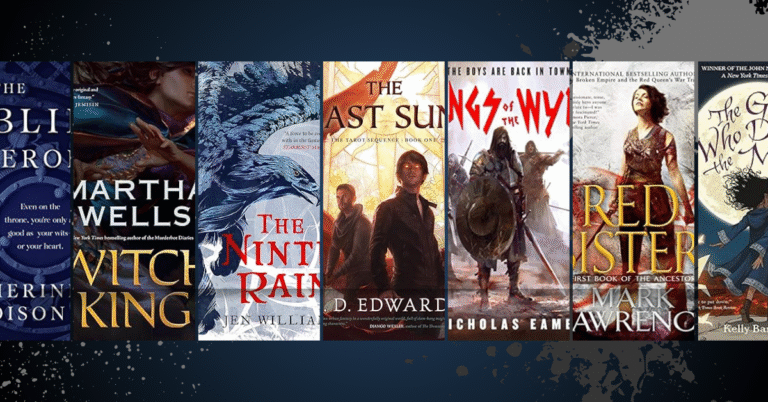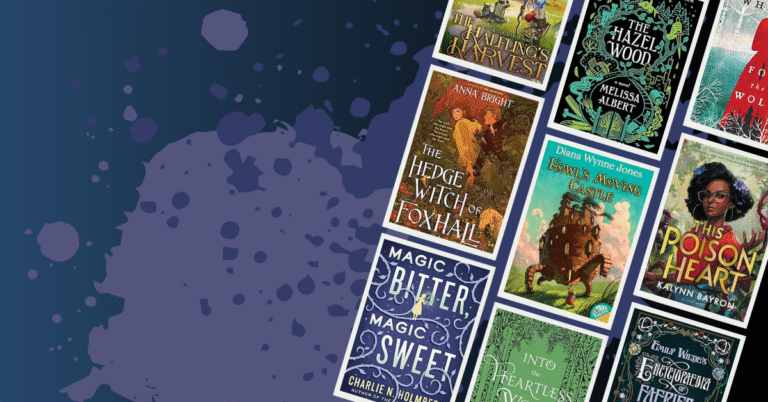Because what if your villain wasn’t really the villain…they just needed to pivot?
Epic fantasy author Tim Facciola didn’t begin his creative journey with books—it began with a microphone and a pop punk band. But after the band split and the creative outlet disappeared with it, Tim found himself looking for something he could do alone—something no one could quit on.
That search led him to storytelling.
In a small New York City apartment, with nothing but silence and a head full of ideas, he dove into writing.
He’d always loved horror as a kid, but the spark that lit the fire came from listening to Game of Thrones audiobooks. Something about the layered characters and sprawling world clicked—and he started dreaming of his own fantasy epic.
Swordplay, Sweat, and Story Arcs
Outside of writing, Tim is a virtual fitness instructor. And not just any kind—he trains with medieval weapons.
Turns out, swinging a steel mace through the air while your body follows a carefully choreographed flow has a way of unlocking creativity.
It’s not just exercise. It’s storytelling training.
Some of his best character arcs have started mid-workout. That mental dance between reacting and controlling—essential to his fitness philosophy—ended up shaping his approach to plot and character.
A rogue idea during a rope flow once inspired an entire redemptive storyline for a villain. It hit him, quite literally, like a rope to the shin.
That same blend of precision and intuition found its way into his fiction, especially in the epic that would launch his writing career.
A Trilogy That Starts with a War and Ends with a Question
Tim’s debut trilogy, A Vengeful Realm, weaves together elements from Spartacus’s rebellion, Greco-Roman mythology, and political drama in the vein of A Song of Ice and Fire.
But what really sets it apart is its moral complexity.
The story asks readers to rethink justice, vengeance, and the power of mercy.
By drafting all three books before publishing the first, Tim had the rare opportunity to lay the groundwork for deeper themes and character turns across the series.
It’s a slow-burn epic that deliberately places hints early on—allowing readers to be surprised later by how much was there all along.
Let’s Talk About Zephryus (and Identity Crises)
Zephryus, the main character of The Scales of Balance, begins his journey without any memory of who he is.
While the amnesia trope has its critics, Tim leaned into it in a fresh way—by using it as a blank slate.
Zephryus’s lack of bias lets readers project themselves into his shoes and reflect on their own values.
That journey of self-discovery isn’t just for Zephryus. Writing him helped Tim reconnect with his own sense of identity, asking hard questions about belief, purpose, and perspective.
The character didn’t just grow—he helped the author grow, too.
When the Fiction Hits Too Close to Home
Ghosts of Reynia, a standalone prequel, emerged during one of the most emotionally charged periods of Tim’s life.
As his mother battled illness, he began shaping a story about family estrangement, death, and the weight of unresolved pain.
It wasn’t until the editing process that he realized just how personal the story had become. As he later put it, “It was like my pain ended up on the page before I even knew what I was doing.”
The narrative centered on a fractured father-son relationship, and without intending to, Tim had mirrored pieces of his own life.
With the help of his wife, therapy, and a reconnection with his family, he refined the story into something raw, honest, and redemptive. As he said, “Even when I didn’t have hope, I wanted the story to have it.”
Why Fantasy Might Be the Realest Genre
Tim believes fantasy is more than escape.
It’s a tool for examining real-world issues from new angles. His stories tackle nationalism, classism, systemic injustice—not through lectures, but through layered characters and difficult choices.
Instead of preaching, he prefers to ask questions.
What happens when vengeance is the way of the world?
Can mercy still thrive?
Can a reader be persuaded to let go of judgment, even toward the most villainous character?
Through myth and metaphor, his worlds become mirrors.
Coaching for Creatives (No Sit-Ups Required)
Tim’s passion for teaching didn’t stop with fitness.
As a writing coach, he now helps new authors find their process, avoid burnout, and learn to trust their instincts.
One of his signature techniques is the “spook statement”—a two-sentence summary that outlines the situation, protagonist, objective, obstacle, and climax. If you can write that, you’re already building structure.
He’s also a big believer in community. Writing doesn’t have to be a lonely endeavor. In fact, it shouldn’t be.
With support systems in place, writers are more likely to thrive, grow, and keep showing up—even on the hard days.
The Future Is Full of Beasts, Board Games, and Big Feelings
Tim is currently working on a new trilogy set in the same universe, but in a different region and time period.
This story explores codependent relationships, rising sea levels, and a world hunted by sentient beasts. It’s a deeply emotional journey that zooms in on individual trauma while reflecting larger global themes.
He’s also dipping into game design, adapting some of his storytelling ideas into a board game.
It’s still in development, but the process is helping him rethink narrative structure from a new angle—one that’s as interactive as it is immersive.


